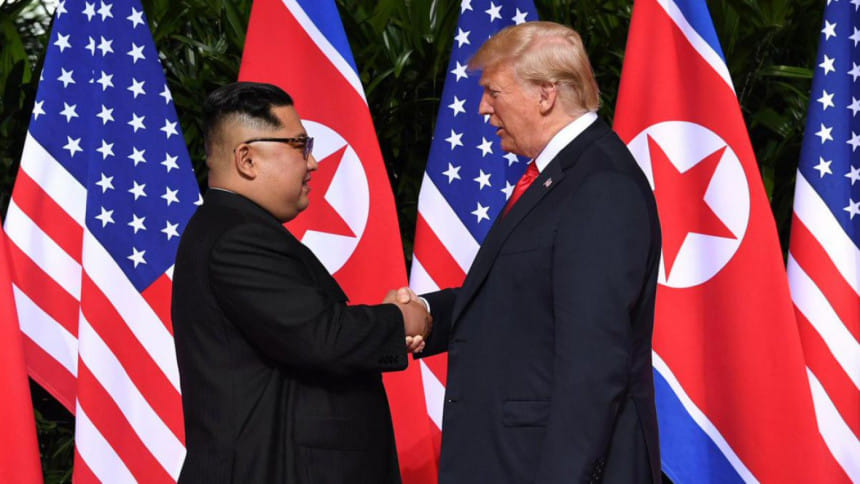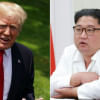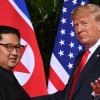A great moment in the history of the world

What-ever may be the details of the deal signed between President Trump and Chairman Kim, both the two leaders (along with Moon Jae-in of South Korea and others) must be congratulated for what can only be a deal that is good for peace. The deal provides great relief for the people of Asia, and as Bangladeshis, we too sincerely welcome this encouraging development.
It was only months ago when few would have thought that the historic Trump-Kim Summit would take place at all, let alone produce what seems to be extremely productive talks that may well lead to long-term de-escalation of tensions on the Korean Peninsula and permanent peace even.
Now one can easily argue that direct conflict has been avoided on the Korean Peninsula since July 27, 1953 when fighting in the Korean War ended with the signing of an "armistice" by North Korea, China and the US (South Korea was not a signatory)—but the fact remains that a validated "peace treaty" is yet to be signed, meaning, that the Korean War never "technically" ended. Even President Trump alluded to that after the summit, saying that a permanent peace treaty should be signed soon, which is very encouraging.
But, most importantly, there had been plenty of times in the past when it seemed like tensions would boil over and that the world was only minutes away from another conflict on the peninsula, which could just as easily have expanded to the wider region and the world even. For a moment, however, the world seemed to have forgotten all that, and justifiably so, when Kim Jong Un said with President Trump sitting right beside him, that he wants to "leave the past behind". And that took enormous courage, as the past that he was referring to is as horrific as it gets for the Korean people.
As General Douglas MacArthur said back in 1951, the Korean War "…destroyed that nation of 20 million people. I have never seen such devastation. I have seen, I guess, as much blood and disaster as any living man, and it just curled my stomach, the last time I was there." Similarly, Curtis LeMay, who went on to head the US Strategic Air Command later, wrote: "We burned down just about every city in North Korea and South Korea both...we killed off over a million civilian Koreans and drove several millions from their homes, with the inevitable additional tragedies bound to ensue."
Thus, the fact that the Koreans are "ready" to begin anew is an extremely good sign. And the fact that they are "willing" was made evident by the signing of a "comprehensive" document between the two parties which said that North Korea has agreed to "complete-denuclearisation of the Korean Peninsula" in exchange for President Trump committing "to provide security guarantees to the DPRK". This includes (although it is not clear whether this was written down or not) the US and South Korea stopping what Trump described as "wargames" near the North Korean border.
This, after a 40-minute-long private meeting between Chairman Kim and President Trump which preceded much longer negotiations between representatives from the two countries—months-long in some cases. What was also good to see was the two leaders getting along and sharing respectful words about each other after numerous heated exchanges via the media in the past. And, more importantly, both acknowledging that this is what the people of the two countries, as well as the rest of the world, wanted to see, as peace and good relations are what is in the best interest of all.
And, yet, this summit had even broader implications, as what is easy to forget, but shouldn't, is the role played by China in mediating the early stages of communications between the two sides. And equally important to acknowledge is Russia doing a good job by encouraging North Korea to go forward with the negotiations with the US—when North Korean representatives earlier visited Russia—and for playing a constructive, rather than deconstructive role, even though it could have easily done otherwise to aggravate a US which has been anything but kind to it in recent times—implementing numerous sanctions on it, etc.
Thus, what this summit illustrated is that not only can the differences between large and small countries be settled in a civilised manner that takes into account the interest of both sides, but also that when big powers work with each other, rather than against, good things can happen, and peace can prevail. This historic summit then, can and should serve as an example for future negotiations, instead of the "bomb first, talk later" policy that has plagued the world for the last few decades, if not longer, causing immense suffering for people of all continents. And a good place to start with that in the interest of much broader prosperity in Asia would be over the issues involving the South China Sea.
Granted that there is much work to do still to ensure long-lasting peace on the Korean Peninsula and the region as a whole, what this summit can do is give hope. Hope that, as President Trump said, "the past does not have to define the future." And that regardless of how dim and terrible the past was, the future can indeed be much better and brighter.
Finally, something that everyone can take away from the summit is a reminder that President Trump gave to the press after it was over, that the summit was simply "the beginning of an arduous process," but in spite of that, "peace is always worth the effort." Keeping that in mind, let's hope that this summit would lead to a truly peaceful and prosperous future for the people of the US, North Korea, South Korea, and the rest of the world. One which everyone can someday look back on as a truly great moment in the history of the world.
Eresh Omar Jamal is a member of the editorial team at The Daily Star. His Twitter handle is: @EreshOmarJamal










Comments